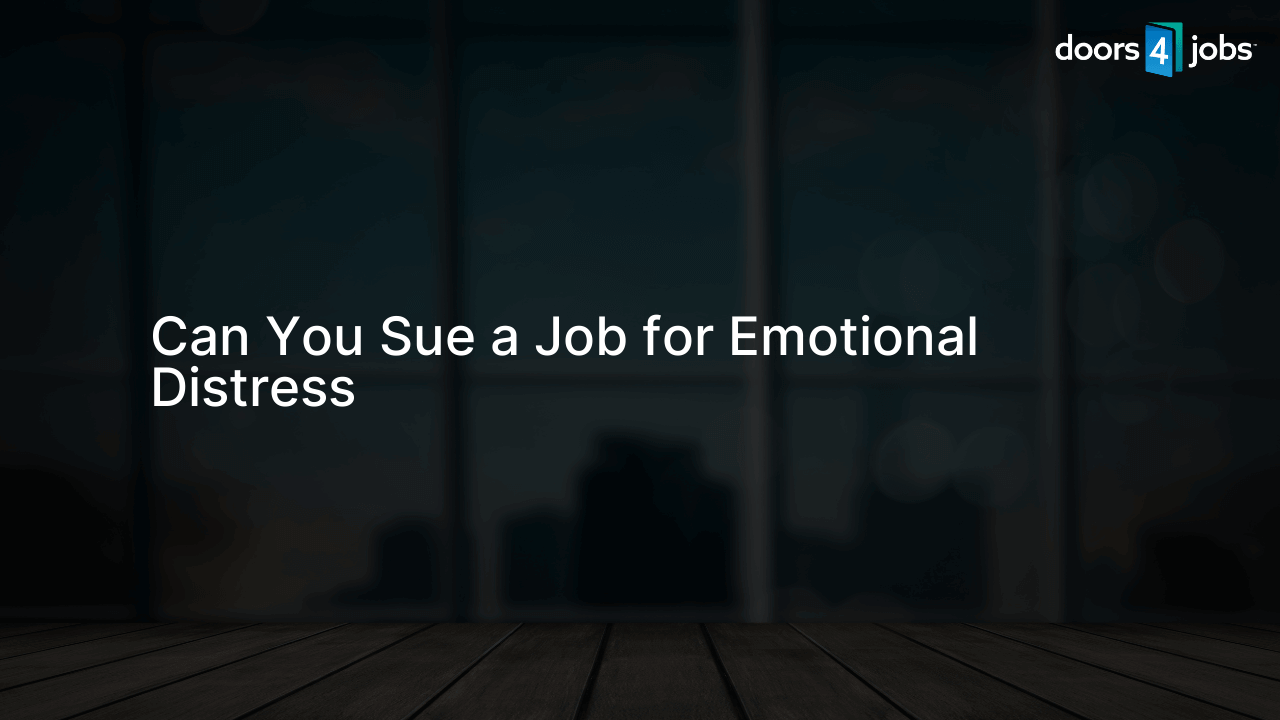Yes, you can potentially sue a job for emotional distress if the employer’s conduct was extreme and outrageous, leading to severe emotional suffering. However, proving such a claim in court can be challenging, as you must establish the employer’s liability and demonstrate a tangible impact on your emotional well-being.
Understanding Emotional Distress Claims
Emotional distress claims generally involve cases where the plaintiff experiences severe emotional suffering due to someone else’s actions. In a workplace context, suing a job for emotional distress means holding the employer responsible for causing extreme emotional harm through their conduct.
Outrageous Conduct At Work
For a successful emotional distress claim, the employer’s actions must be considered extreme and outrageous. Such conduct goes beyond mere insensitivity or rudeness—it must intentionally cause distress or disregard the employee’s emotional well-being. Outrageous conduct may include harassment, discrimination, retaliation, or wrongful termination.
Examples of Outrageous Conduct
Some common examples of outrageous conduct in the workplace may include:
- Consistent and severe bullying or harassment
- Significant acts of discrimination due to race, gender, or other protected characteristics
- Retaliation for reporting wrongful conduct
- Deliberate infliction of emotional harm through threats or hostile work environments
Establishing Employment Relationship
To sue a job for emotional distress, you must establish an employment relationship between you and the employer. Evidence of an employment contract, job duties, work hours, and compensation are essential in proving this relationship exists. Independent contractors and those with limited employment may encounter challenges when filing an emotional distress lawsuit against an employer.
Proving Emotional Distress
Proving emotional distress in court requires demonstrating that the employer caused severe emotional harm. There are typically two types of emotional distress claims: intentional infliction of emotional distress (IIED) and negligent infliction of emotional distress (NIED).
Intentional Infliction of Emotional Distress (IIED)
IIED claims require proof of:
- Outrageous conduct by the employer
- Intent to cause emotional distress or reckless indifference
- Severe emotional distress experienced by the employee
- A direct link between the employer’s conduct and the emotional distress
Negligent Infliction of Emotional Distress (NIED)
NIED claims need evidence of:
- The employer’s negligence or failure to fulfill a duty
- Emotional distress experienced by the employee as a direct result of the employer’s negligence
- Severe emotional distress that was reasonably foreseeable
Seeking Legal Help
If you believe you have suffered emotional distress due to your employer’s outrageous conduct, it is advisable to consult with an employment law attorney to help you assess your case’s merits and guide you through the process of filing a lawsuit.
Compensation for Emotional Distress Claims
If your emotional distress lawsuit is successful, the court may award compensation for the damages you have suffered. Compensation may include monetary relief for the following:
- Medical and therapy expenses related to the emotional distress
- Lost wages and future earning capacity
- Pain and suffering caused by the emotional distress
- Punitive damages, depending on the severity of the employer’s conduct (in cases of IIED)
Statute of Limitations
It is crucial to remember that emotional distress claims are subject to a statute of limitations, which varies by state. The statute of limitations sets a time frame within which you can file a lawsuit for emotional distress. If you fail to initiate legal action within this allotted period, your case may be dismissed, and you may lose the opportunity to seek compensation. Consulting with an attorney as soon as possible will help ensure you meet all necessary deadlines.
Documenting Emotional Distress
When filing a lawsuit for emotional distress, having ample documentation is essential to support your claim. Here are some ways to gather evidence for your case:
- Maintain a record of incidents, including dates, times, locations, and individuals involved
- Collect photographs, videos, or audio recordings (if legally obtained) showing the employer’s conduct
- Save any relevant emails, text messages, or other written communication
- Consult with medical professionals or therapists and request records of your treatment or diagnoses as a result of the emotional distress
- Gather witness statements from colleagues or others who can attest to the employer’s conduct
Alternative Dispute Resolution
In some cases, pursuing a lawsuit might not be the most effective approach for resolving your emotional distress claim. Alternative dispute resolution (ADR) methods, such as mediation or arbitration, provide a less formal and potentially quicker way to address your concerns and reach an agreement with your employer. Speak with an attorney to evaluate the best course of action based on your unique situation.
FAQ Section
In this section, we address some commonly asked questions related to suing a job for emotional distress. Gain insights into necessary proof, types of damages, and more to better understand the intricacies of such claims.
What qualifies as severe emotional distress?
Severe emotional distress refers to intense psychological suffering caused by another person’s actions. Typical manifestations include depression, anxiety, post-traumatic stress disorder (PTSD), insomnia, or other debilitating emotional or mental health conditions. Generally, these symptoms must be provable and go beyond temporary stress, sadness, or frustration.
How do I prove my employer intentionally inflicted emotional distress?
Proving intentional infliction of emotional distress (IIED) requires demonstrating that your employer engaged in outrageous conduct with the intent to cause emotional harm or reckless indifference to the possible distress. Evidence can include records of incidents, written communication, witness statements, and medical documentation of your emotional suffering directly linked to the employer’s actions.
Can I sue for emotional distress due to workplace harassment?
Yes, if the harassment is severe, pervasive, and involves a protected characteristic such as race, gender, disability, or religion, you might have a case for emotional distress. In addition to filing an emotional distress claim, you could file a discrimination or harassment claim under federal or state anti-discrimination laws.
Can I sue for emotional distress caused by wrongful termination?
Yes, if your employer wrongfully terminated you due to discrimination, whistleblower retaliation, or violating your employment contract, and you suffered severe emotional distress as a result, you could potentially sue for damages. An experienced employment attorney can help assess your claim and guide you through the legal process.
What type of damages can I receive in an emotional distress lawsuit?
In an emotional distress lawsuit, you may receive compensation for medical and therapy expenses, lost wages, future earning capacity, and pain and suffering related to your emotional distress. In cases of intentional infliction, you might also be awarded punitive damages if the employer’s conduct is particularly egregious.











